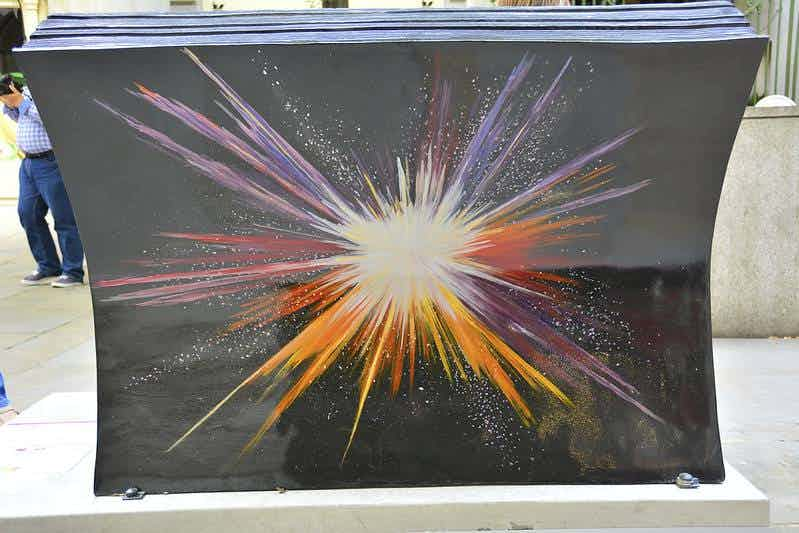There’s never a year that goes by where you can’t learn something new and with near-endless non-fiction books covering every possible topic under the sun and beyond it, there’s ample opportunity to do so.
Throughout these turbulent times, connecting to new knowledge has been a crutch for many.
These 20 wonderful non-fiction books can forge new interests, insights and enthusiasms.
Designed in the quintessential style of the Haynes workshop manual, this ‘manual’ entitled Universe explores space in a pragmatic and constructive way.
Written by space historian David Harland, Universe is thorough in its approach to universal theories whilst remaining fresh. It delves into the mechanics of cosmology as well as key actors and figures in humanity’s quest for answers.
There are also superb illustrations, just like a true Haynes manual. Suitable for both adults and children.
2) The Lost Café Schindler: One family, two wars and the search for truth - Meriel Schindler
The Lost Café Schindler is a family memoir, that family being the famous Schindler family that includes Oscar Schindler, a German industrialist who helped many Jews escape deportation to concentration camps.
This book follows the history of Jews in the Austro-Hungarian Empire, it’s gripping and exploratory - you can follow the author’s discoveries, her search for truth and the reconciliation of tragic events that involved her family and so many others.
3) A Life on Our Planet: My Witness Statement and a Vision for the Future - David Attenborough
The emblematic British naturalist that we all know and love has always been an avid writer as well as a broadcaster.
Attenborough’s bibliography spans a remarkable 70 years, each work building on the sense of reflection that comes with age and experience.
His latest book explores what Attenborough would argue himself as the greatest tragedy of our time - mass extinction, climate change and the irrevocable destruction of the natural environment.
This book is a witness statement, the author is the witness of how humanity has come to destroy the planet we so dearly call home - a wicked twist of fate - and one last chance to make it right.
This book is clear and compelling, emotionally powerful and details world issues with total clarity. It has received widespread critical acclaim and is exceptionally well-reviewed.
4) Sapiens: A Brief History of Humankind - Yuval Noah Harari
Sapiens: A Brief History of Humankind is a rare combination; a history book that tackles the broad remit of human existence in a compelling, engrossing and provocative fashion.
From the Stone Age to the age of Silicon Valley, Harari charts the duality of humanity - our capacity to both create and destroy the world around us.
Whilst the book’s at-times provocative take on humanity has polarised some readers, it remains one of the most popular and highly-rated books in its niche.
It also acts as a prequel to Homo Deus: A Brief History of Tomorrow, a futuristic vision for what humankind is becoming in the age of technology.
5) Midnight in Chernobyl: The Untold Story of the World's Greatest Nuclear Disaster - Adam Higginbotham
HBO’s drama Chernobyl renewed British interest in this tragic yet mysterious disaster.
As the Soviet veil lifts on what we now know is a catalogue of mistakes that sent Chernobyl’s nuclear generator spiralling towards inevitable failure, historians have started to reopen lines of enquiry.
This is one of the most compelling historical investigations yet. It breaks down the story of Chernobyl in great detail whilst preserving the horror of the event.
Pulling the reader straight into the core of the disaster, journalist Adam Higginbotham manages to pull off an excellent work of modern historical non-fiction.
6) Carrying the Fire: An Astronaut's Journeys - Michael Collins
If you ask someone “who were the first people to walk on the moon” they’ll probably give you at least one name, Neil Armstrong, maybe two, adding Buzz Aldrin, but rarely three.
Michael Collins is the third member of the original Apollo 11 lineup, the pilot that remained on the ship whilst the other two walked on the moon. He also happens to be a superb writer.
Carrying the Fire: An Astronaut's Journeys is a phenomenal memoir, one that recounts events of such immense importance and magnitude in a grounded, natural, witty and humorous way.
It’s also a reflection on the miracles and fragility of life, and what it means to live on what astronomer Carl Sagan called “the pale blue dot”.
Pale Blue Dot by Sagan himself is another exemplary literature on space.
7) The Boy, The Mole, The Fox and The Horse - Charlie Mackesy
This is not really a non-fiction book, but as a book that occupies a somewhat unique area within literature, it’s more-than-worthy of its spot on both non-fiction and fiction line-ups.
Writer and artist Charlie Mackesy pulls together artwork and calligraphic narratives in this ode to kindness, empathy and compassion.
Following four characters, a curious boy, a greedy mole, a wary fox and a wise horse, its powerful messages about the human spirit are moving and universally intelligible.
This is a book for all ages, a tome of wisdom, but it’s also a work of art. The Boy, The Mole, The Fox and The Horse has become hugely influential - it's simple but profound.
8) The Element: How Finding Your Passion Changes Everything - Ken Robinson
A self-help book more than anything, Ken Robinson explores what he dubs ‘The Element’ - the point at which talent and passion fuse into one.
It is by finding The Element, Robinson argues, that we can uncover our life’s purpose.
Robinson explores people from varying backgrounds including Paul McCartney, Matt Groening and Vidal Sassoon, decoding how they themselves found The Element, and how this catalysed their excess.
This is a pragmatic self-help book, it’s not preachy or odious but wry and humorous - an entirely fresh take on the common affliction of personal discontentment.
9) Guns, Germs and Steel: A short history of everybody for the last 13,000 years - Jared Diamond
This groundbreaking Pulitzer Prize-winning book is an ambitious multidisciplinary synthesis of human history.
Dubbed by Time as one of the most important non-fiction books ever written, Diamond puts forward his case for why humans, past and present, have become so divided between the haves and the have-nots.
The scope of this book is immense but thorough in its scientific and anthropological approach to human evolution and society.
For those that want to delve into areas of our past previously covered, this is a sublime work of popular scientific non-fiction writing.
10) A Short History of Nearly Everything - Bill Bryson
In a similar topical vein as the aforementioned book, A Short History of Nearly Everything is perhaps one of the most widely known books on, well, nearly everything.
Bryon’s literary style is famous for its humour - often cynical in flavour. He can crack a smile from asking and answering profound questions about human history and science, which is a tough task.
This makes A Short History of Nearly Everything effortlessly readable and accessible.
It’s profound but light on its feet - an info-rich book that you can rip through and be all the wiser for reading.
11) A Brief History Of Time: From Big Bang To Black Holes - Stephen Hawking
The last book we’ll cover in this topical niche, but impossible to leave out.
The acclaimed masterpiece from the world-renowned physicist Stephen Hawking tackles esoteric science with the clarity required for anyone - regardless of scientific background - to understand.
In many ways, this book serves as an opportunity to enter the mind of a true genius.
The grasp Hawking has for the topics is tangible, which makes learning them that bit easier, even when he weaves between theories on dark energy, the information paradox, eternal inflation and gravitational waves.
12) The Story of Music - Howard Goodall
From the British composer Howard Goodall, responsible for the take on The Lord Is My Shepherd that appears as the Vicar of Dibley theme tune, The Story Of Music takes us on a 40,000-year journey from music’s origins to the present day.
The Story Of Music is an investigation into the formal structure, theory and organisation of music as well as the spirit of music and how it has an enduring capacity to uplift and inspire us.
13) Prisoners of Geography: Ten Maps That Tell You Everything You Need to Know About Global Politics - Tim Marshall
Geopolitics - it’s not the most accessible concept to outsiders, but former Sky News Diplomatic Editor Tim Marshall does a stellar job of introducing the reader to the complexities of geopolitics and international diplomacy.
This book departs the themes of technology and information - or IT - and instead puts physical geography under the spotlight - the soil and earth that divides nations and how we’ve come to live and die by our borders.
A very smartly and clearly written work on a critically important topic.
14) The Science of Self-Discipline: The Willpower, Mental Toughness, and Self-Control to Resist Temptation and Achieve Your Goals - Peter Hollins
Self-discipline gets in the way of many important life goals, ambitions and decisions. But how can we stop being enslaved by our own ill-discipline and become the master of our own destiny?
A powerful book that acts as a psychiatric and psychological investigation into the topic of self-discipline as well as a self-help book, Peter Hollins sets about teaching his approach to the topic.
This book is designed to improve mental toughness and fortitude, it has built a glowing reputation for achieving exactly that amongst its readers.
15) This Book Could Save Your Life: The Science of Living Longer Better - Graham Lawton
This book, written in collaboration with New Scientist, seeks to discover and consolidate a burgeoning body of research into our mental and physical health.
It’s designed to be a clear and concise instruction towards embracing a healthier life, enabling us to detach health fads from facts and make informed decisions about our health.
This is a pragmatic and powerful self-help book that has amassed a very solid reputation despite not being out long in 2021.
As you might guess, its association to the New Scientist ensures that the book is scientifically rigorous - it only entertains alternative health approaches where there is sufficient cause to do so.
16) The Prison Doctor: Women Inside - Dr Amanda Brown
Women’s prisons are a seldom-told story, but have gained increased coverage over the past decade or so.
Dr Amanda Brown’s autobiographical account of life inside women’s prison is socially revealing and emotionally powerful. It’s a harrowing read, some of the stories are heartbreakingly sad, but there are also glimpses of optimism, hope and reconciliation.
The realism and brutal honesty of these accounts bring them to life in all their intricate and visceral detail. An excellent investigation into the untold stories of women’s prison.
17) Invisible Women: Exposing Data Bias in a World Designed for Men - Caroline Criado-Perez
This highly topical Sunday Times Number 1 Best Seller has been dubbed a monumental piece of research.
As the modern incarnations of discrimination, sexism and gender prejudice continue to rear their ugly head, this important synthesis of the key issues is as timely as it is effective.
This book really breaks down the shocking structural gender bias that persists in our society today. Some of the statistics uncovered by Perez are startling, quantifying bias in an undeniable fashion.
By combining formal statistical research with case studies, stories and anecdotes from around the world, Invisible Women: Exposing Data Bias in a World Designed for Men is a powerful feminist critique of the highest order.
18) Inspire: Life Lessons from the Wilderness - Ben Fogle
Ben Fogle has come a long way as a broadcaster and writer from his first appearance in Castaway, back in 2000.
His long-running series New Lives In The Wild has seen him immerse himself in the lives of those who choose to settle off-grid.
This book is a reflection on his experiences, mistakes, lessons, morals and visions for the future.
It’s funny and witty, a thoroughly humanistic account of life in the wilderness.
19) World War II Map by Map - DK
Following World War II in exquisite detail from land to sea and air, this excellent historical work animates the conflict with visual maps and overlays that help explain its development.
This book was actually written by a full team of war historians with senior historian Richard Overton at the helm, so you can be assured of its historical rigour and depth of research.
The maps and archival photographs really bring this book to life, helping the reader visualise the mechanics of the war and how it came to a head in 1945.
20) Forces of Nature - Brian Cox and Andrew Cohen
Brian Cox and his long-term writing partner and BBC producer Andrew Cohen’s Forces of Nature is riveting and original in its investigation of the laws of nature.
Instead of looking at the universal macro, this book looks at the universal micro, the forces that shape everything from snowflakes to the spirals of the galaxies.
Brian Cox’s extremely popular and evocative narrative style really animates these complex concepts, making the entire book feel like the story is being read to you.
Bringing some of the earth’s and universe’s most bizarre natural phenomena to the fore and exploring the intrinsic link that exists therein, Cox is able to enlighten his audience in a highly memorable and impactful way.
Image Credit: Martin Pettitt, CC BY-SA 2.0








